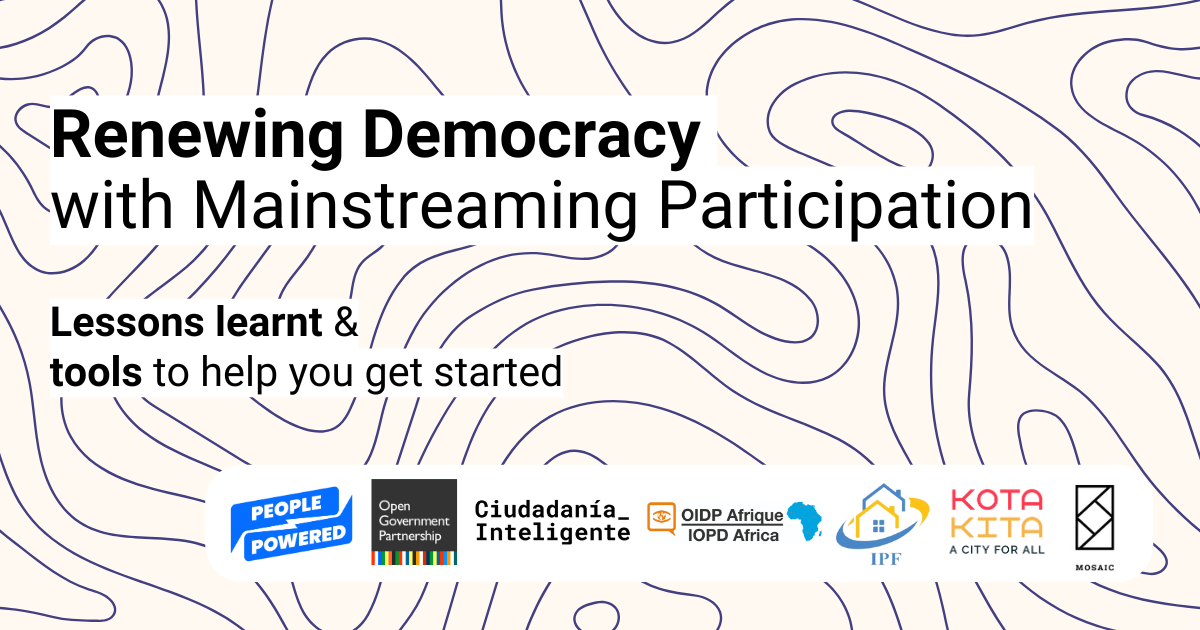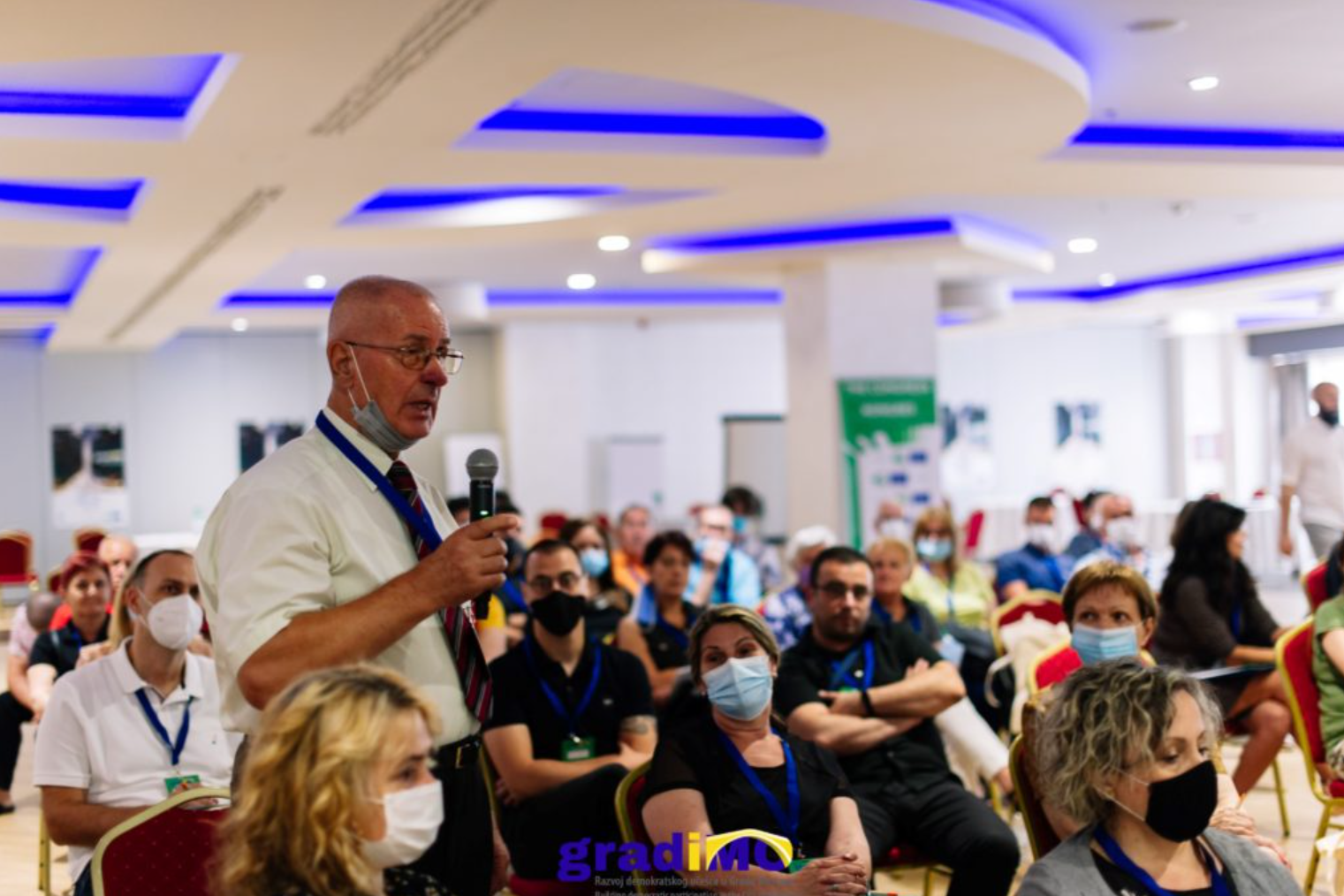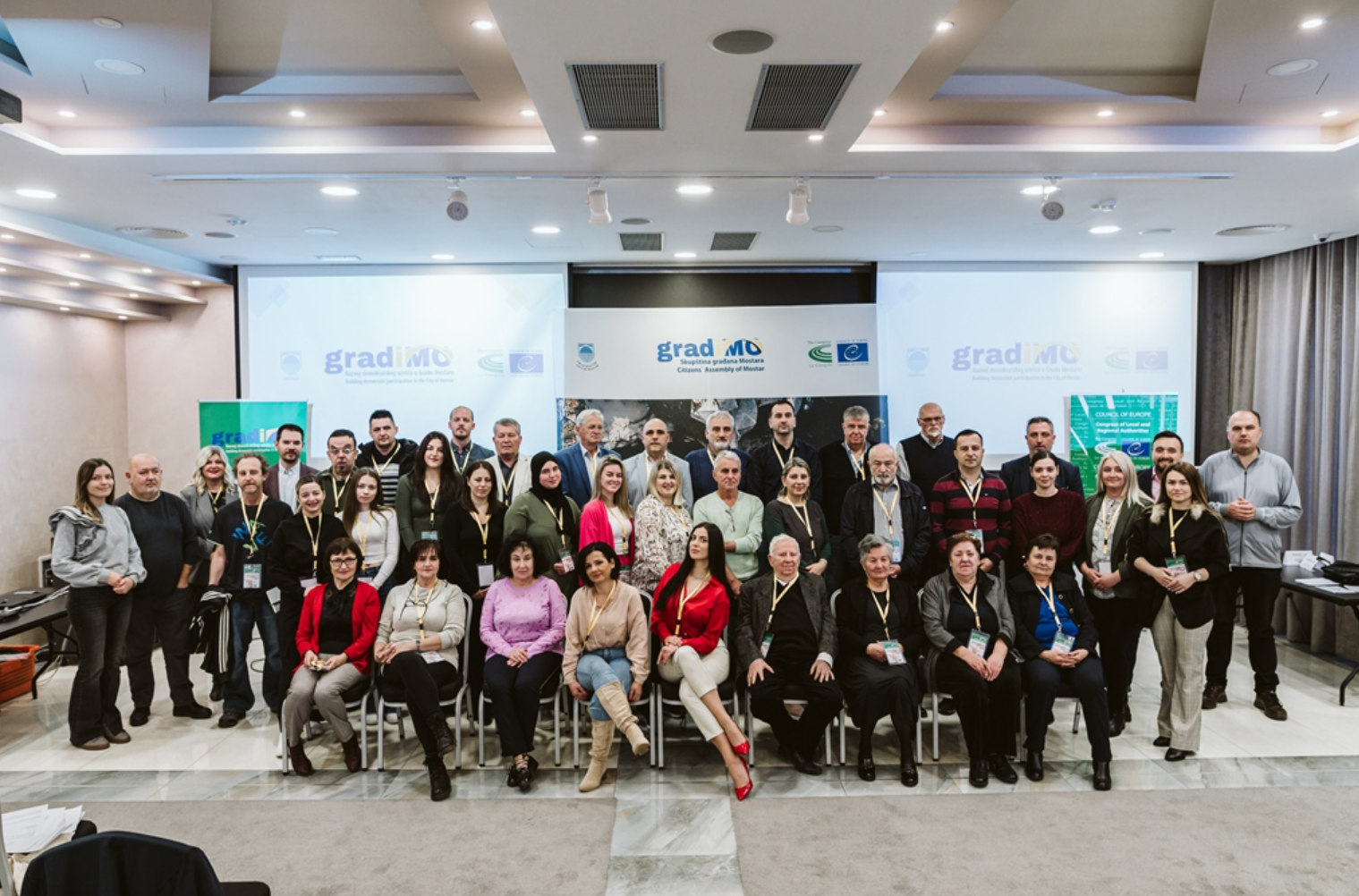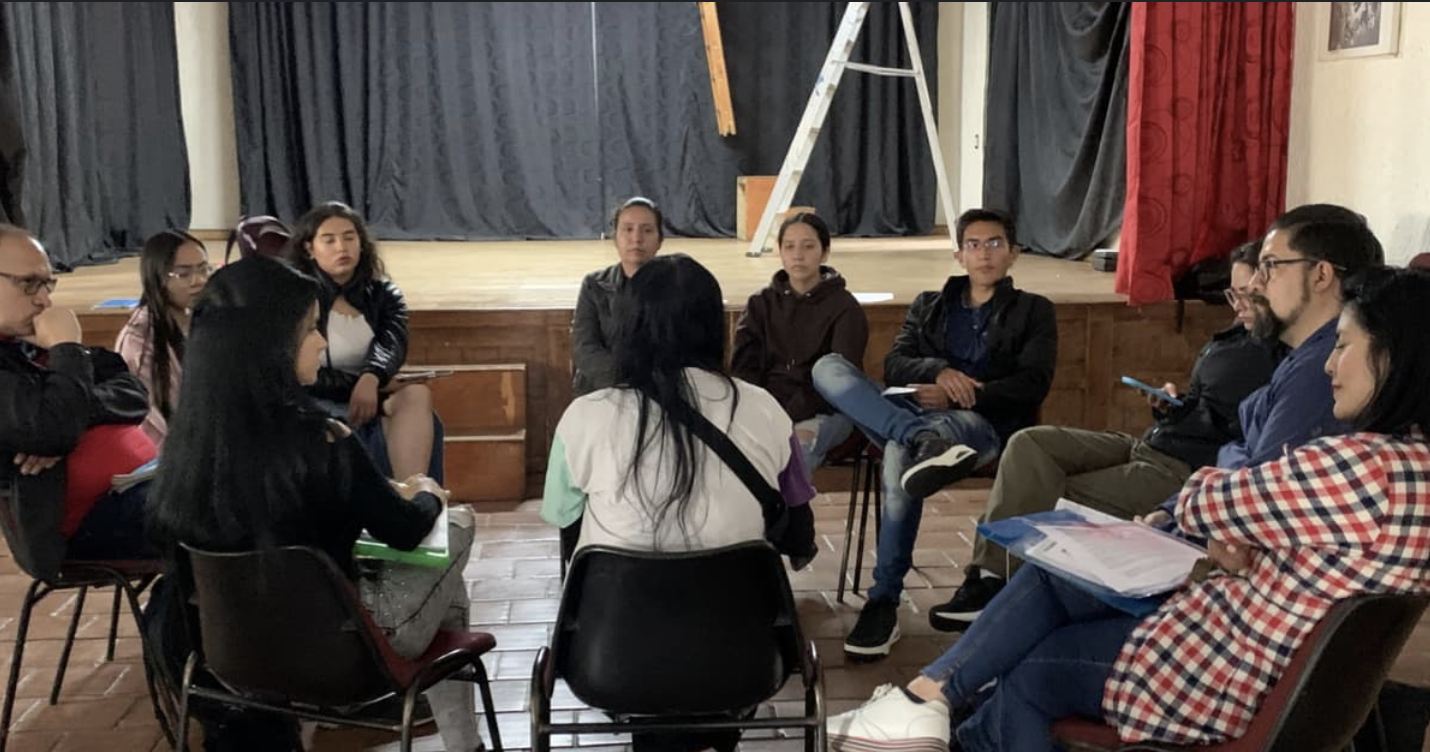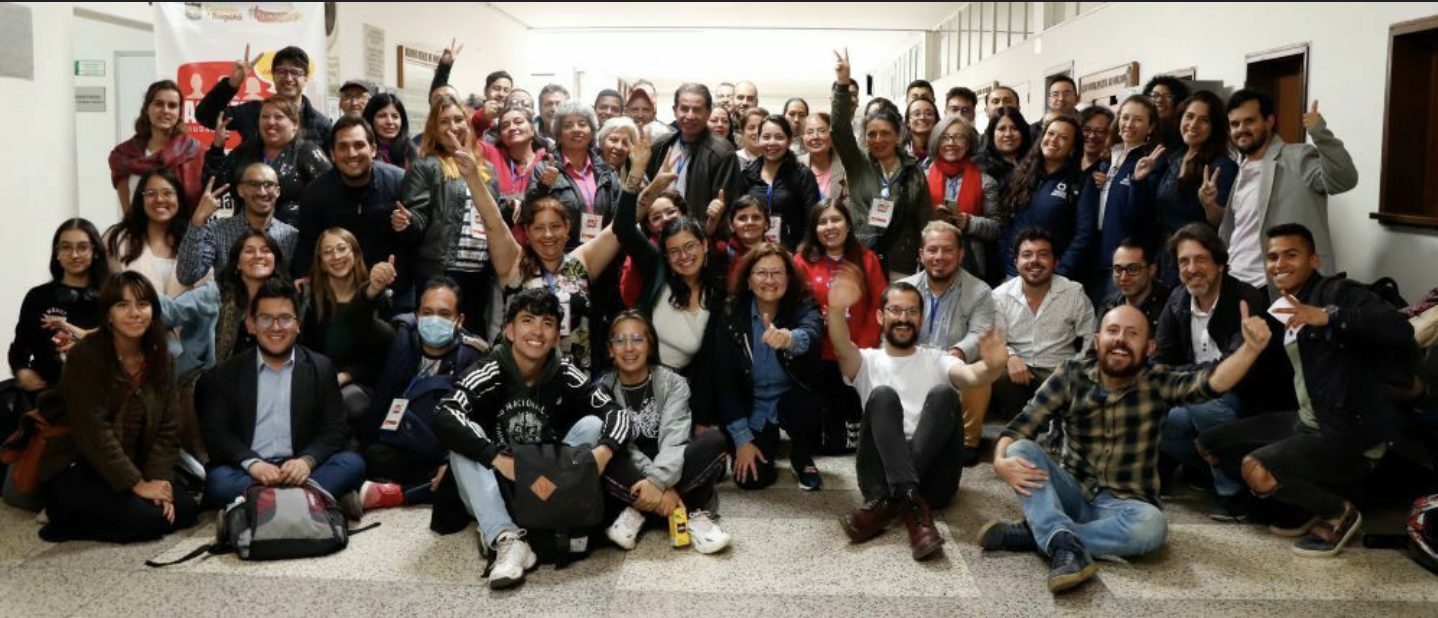Renewing democracy by mainstreaming participation: Lessons learned and tools to get started
/By Maria Lucien, Program Associate
To support democratic renewal around the world, the People Powered community and partners are prioritizing the scaling up and protection of citizen participation in democratic systems. In this post, we share the key takeaways and highlights from our regional partners’ research on the landscape of mainstreaming innovations around the world. Interested in applying these innovations in your context? Learn about our new practical tools on the impacts of participatory democracy and a step-by-step Playbook for mainstreaming participation to strengthen our democracies through mainstreaming innovations.
First, what do we mean when we say mainstreaming participation?
Mainstreaming participation refers to embedding and insulating rights and access to participation within governance. This can take various forms ranging in complexity, from a knowledge-sharing session to an innovation lab. Conceptually, mainstreaming participation is not just about integration — it’s about renewal. It aims to shake the foundations of governance. In places where bureaucracy is facing gridlock, where communication between and within institutions has broken down, and where people are disengaged because the system is structurally ill-designed to include them, mainstreaming participation is not just a procedural shift. It’s a transformative one.
Mainstreaming participation has the potential to change the way people understand power, decision-making, and their own agency. Mainstreaming participation is a vehicle of systems change: shaping the mental models of how we think about democracy, decision making, and institutional change.
The different faces of mainstreaming
At a webinar we hosted on the global renewal of democracy, one thing was made clear: mainstreaming participation is not only possible, it’s already happening. The regional cases presented during the webinar and that informed the development of People Powered tools below aren’t valuable because they’re neat and tidy. They’re useful precisely because they’re real and messy, offering a starting point for bigger shifts to come. They show that mainstreaming doesn’t need a perfect environment or perfect enabling conditions.
We know evidence makes the case. Reformers need more than ideals—they need results they can point to.
Our Impact Data brings together curated global research on how participation affects trust, accountability, civic engagement, and governance outcomes.
Our new Mainstreaming Participation Playbook offers a hands-on, customizable guide to designing and advocating for participatory governance reforms.
Built from field experiences in contexts like Mostar, Bosnia and Herzegovina; Bogotá, Colombia; Senegal; and West Sumbawa, Indonesia; the Playbook addresses real-world challenges with practical tools, reform pathways, and advocacy strategies. These tools will provide you with the guidance to build on and incorporate these learnings into your work.
Let’s take a trip through Eastern Europe, Africa, Latin America, and Asia to see how people are finding ways to carve out renewed spaces for deliberation, community voice, and power-sharing.
Mostar, Bosnia and Herzegovina: Making something out of nothing at all
Bosnia presents a textbook case of democratic disintegration: deeply fragmented governance, entrenched ethnic divisions, near-total absence of institutional trust. The city of Mostar is no exception, having had no democratic elections for over 12 years due to indecisive administrations and political gridlock in its post-conflict era.
The Mostar Citizens’ Assembly came about not through orderly government planning but through a collision of civil society pressure, international scrutiny, and strategic litigation (notably Irma Baralija’s case against the city of Mostar at the European Court of Human Rights and the “Elect Mostar” mock campaign). This eventually resulted in intervention from the Council of Europe following widespread support for change in the European community, leading to the implementation of two Citizens’ Assemblies for the first time in Bosnia and Herzegovina.
The assembly led to the formation of city council processes, maintenance protocols, tourism and transport policies. A rulebook for citizens’ assemblies was also created, facilitating peer learning across the region. It even impacted the culture of governance, strengthening inter-entity cooperation through a joint meeting between the Federation of Bosnia and Herzegovina and Republika Srpska (the two main autonomous entities governing the country).
Senegal: Shifting power through education
Senegal’s story is one of gradual, layered democratic growth. Since the 1980s, it’s moved toward decentralization and democratic reforms. After its second peaceful political transition in 2000, the country became a site for participatory experimentation, including pilot participatory budgeting processes heavily influenced by Porto Alegre. Peer learning, training programs, and the codification of best practices for process design and inclusion through a range guides are shaping the foundation for change alongside formal, legal mandates such as the Participation Charter.
In 2018, Senegal joined the Open Government Partnership (OGP) with an ongoing national commitment towards institutionalizing participatory budgeting. Via the National Local Development program, participatory budgeting has now been implemented in 105 municipalities. This has led to improved trust between government and citizens, improved inclusion of vulnerable and marginalized groups in decision making outcomes and improvements in access to information.
Mainstreaming here has focused on changing mental models of how officials, ministries, and communities understand the relationships between power, legitimacy, and governance to pave the way for a more participatory governance culture. Where the challenges to active citizenry are primarily centered around lack of information and education, mainstreaming in Senegal has responded to the gap with educational materials co-designed by civil society and government agencies, training programs, frameworks and best practices.
Bogota, Colombia: Evolving in continuity
Colombia, like many other countries in Latin America riding the “pink wave”, has been trending towards greater participation and democratic decision making. Here, Bogotá has emerged as a flagship for structured, sophisticated participatory design.
In 2020, Bogotá launched an itinerant Citizens’ Assembly (CA) through its public innovation lab (DEMOLAB). Bogotá’s lab has implemented the assembly with annual budgeting, repeat cycles, and iterative design baked into the format. Furthermore, a percentage of the assembly participants (15-30%) continue on into the next assembly. Outputs from the CA have fed directly into Bogotá’s territorial planning plans, policy strategies, and citywide visioning frameworks. Plans are already underway for a meta-assembly—a deliberative process to reflect on and redesign the CA itself. This kind of recursive, reflective design allows for better practice, better inclusion and ultimately better outcomes.
West Sumbawa, Indonesia: Embedding participation into tradition
Indonesia’s reformation era (post-1998) created a democratic opening, and decentralization in 1999 allowed for a wave of greater community involvement in decisionmaking. The Musrenbang, a formalized participatory planning process, is designed to be inclusive but often struggles to reach communities on a grassroots level. In West Sumbawa, mainstreaming has succeeded not because it imported best practices, but because the Musrenbang model was modified to more effectively operate within cultural logics.
The Yasinan Forum is rooted in local community traditions: this informal format values face-to-face deliberation, prioritizes cooperation (gotong royong) as a guiding principle, and values direct accountability and communication in line with the expectations and engagement style of its population. CSOs are appointed as community collaboration agents overseeing every step of the planning process. Government officials (including the mayor and heads of agency) are required to attend, listen and respond in person without intermediaries.
The deeper culture of understanding, renewed trust and community inclusion has paid off: Public service quality has improved measurably (sanitation, public health, grievance redressal). Social norms have shifted with the normalization of open critique of government and administrative responsiveness has increased.
What do you need to mainstream participation? (And how can we help?)
Mainstreaming participation is still in its infancy, but as we’ve seen above, it can be done in a variety of ways and levels of complexity. There is still so much room for innovation to be excited about! While challenges exist obtaining institutional support, political will, and established legal mandates and mechanisms, mainstreaming reforms are well placed to be customized and adapted to diverse cultures and contexts, and to address specific democratic needs.
Whether you're working from inside government or building coalitions from the outside, People Powered offers tools to help you design, advocate for, and implement long-term reforms.
1. Our Impact Data brings together curated global research on how participation affects trust, accountability, civic engagement, and governance outcomes.
We know evidence makes the case. Reformers need more than ideals—they need results they can point to.
It’s backed by real data from Participatory Budgeting (PB) and Citizens’ Assemblies, with a growing focus on new methodologies this year. This includes regional insights from Latin America, Africa, Asia, and Eastern Europe, addressing a major gap in global research often dominated by Europe and North America.
2. Our new Mainstreaming Participation Playbook offers a hands-on, customizable guide to designing and advocating for participatory governance reforms.
Use this data to link participation to actual policy and societal impacts—making a compelling case for why participatory governance should move from ad-hoc experiments to permanent structures.
Built from field experiences in contexts like Mostar, Bogotá, Senegal, and West Sumbawa, the Playbook addresses real-world challenges with practical tools, reform pathways, and advocacy strategies.
Use it to:
Reflect on your enabling environment.
Tailor reform pathways to your governance context.
Design advocacy strategies that resonate with decision-makers.
Build coalitions and sustain long-term engagement.
Whether you’re innovating new models, visioning sector-specific reforms, or coordinating a national policy push, the Playbook helps you think long-term, strategically, and collaboratively.
These tools were developed in collaboration with our members and research partners, including Open Government Partnership, Institute of Public Finance (Kenya), Kota Kita, OPEN MOSAIC, IOPD Africa, and Fundación Ciudadanía Inteligente.
Next steps:
💻 Catch up on the event
Watch the webinar recording
Read the slide deck
💡 Learn and apply
Try out the Mainstreaming Participation Playbook for yourself.
Check out our Impact Data for the latest global research in public participation.
🙋♀️ Take the challenge
Take up the Open Gov Challenge on public participation
Have you tried out these resources? Tell us what you think at info@peoplepowered.org.




